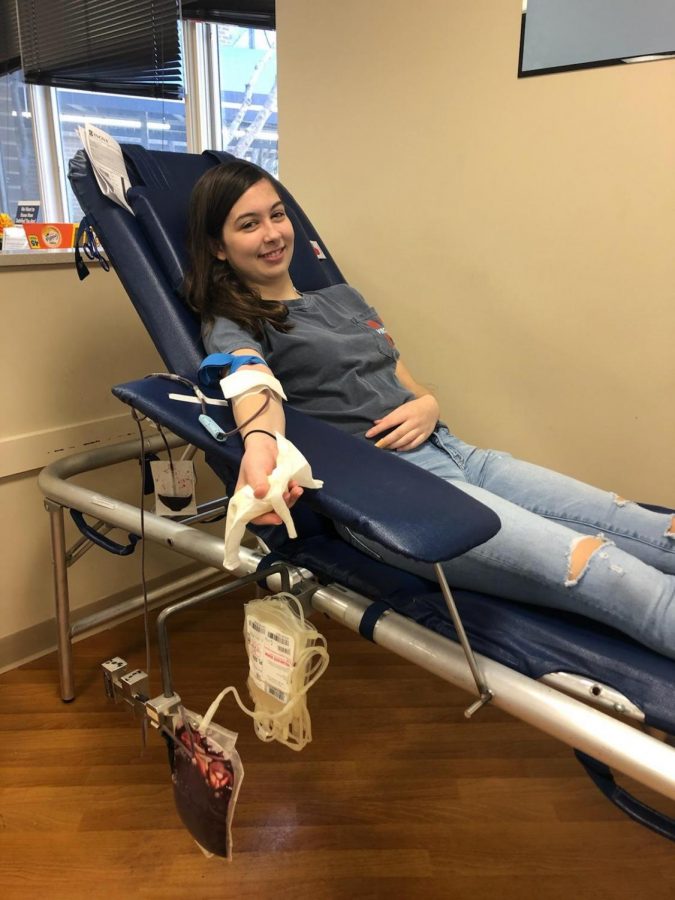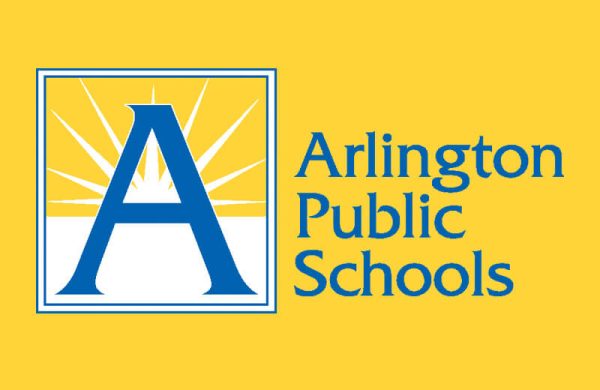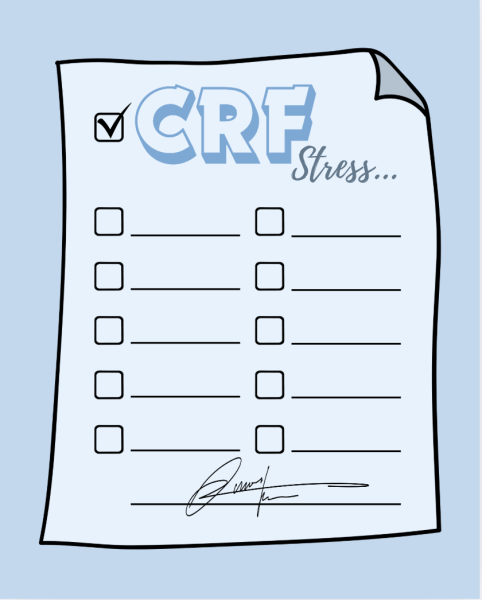Blood drive cancelations lead to blood shortage
Senior Abby Presson, Editor in Chief of the Crossed Sabres, donates blood in the Inova bloodmobile. The hospital system is experiencing a critical shortage of blood due to the cancelation of events such as the Student Council Association’s annual blood drive.
Arlington Public Schools (APS) is shut down for the rest of the academic year due to the COVID-19 pandemic, impacting school events including the spring dance, the spring sports season and the Student Council Association (SCA)’s blood drive. The blood drive was scheduled to be held on March 19 but is now canceled. The blood drive is run through the Inova hospital system and last year the drive collected 59 units of blood. This year, the goal was 75 units where every unit is equated to three potential lives saved. According to Inova, this cancelation is significant because the hospital is experiencing a decrease in blood donations.
“We’ve definitely noticed extreme decreases in blood donations with the schools being closed, so much teleworking going on, people not being out and around and churches starting to close, so all of our blood drives are pretty much drying up,” Terri Craddock, the senior director of Inova Blood Donor Services, said. “Usually we collect about 60 percent of our blood on blood drives. That’s probably down to about 30 percent and dropping. We’re working really hard to drive donors into our blood centers in order to supplement our mobile collections.”
Other areas impacted by COVID-19, such as New York City, have announced a serious shortage in blood. The New York Blood Center has declared a blood emergency as their supply has decreased below required minimums. The shortage comes from these cancelations—the need for blood is ever-present, but schools, universities and businesses are no longer holding these critical events.
“I’m really upset that [the blood drive] has the possibility of being canceled or even just postponed because that means we most likely will not have as many donations,” junior Shea Messman, the first vice president of the SCA, said. “The more it gets complicated, the less people end up donating.”
A dramatic decrease in blood drives will impact the care of the hospital system’s patients and cause outcomes that Craddock says the department is working hard to find solutions for.
“We have to consider doing some things we don’t usually do,” Craddock said. “We’re really working hard to preserve the inventory that we have. As it continues to drop, we’ll have to look at things like canceling elective surgeries or making people wait longer in between transfusions. There’s a lot of different strategies that we’re going to be looking at.”
With the restrictions on mass gatherings put in place in Virginia and around the country, the department may have to change how they collect blood, which could further deplete the blood supply.
“I know that there are new social gathering restrictions [limiting mass gatherings] to ten individuals, so we’re really going to have to take a look and see how we can do that,” Craddock said. “Between our staff and a few donors, we’re going to hit that ten number pretty quickly, so we’ve got to take a look and see how we can accommodate that. I know that some other blood centers have considered going to people’s homes and drawing there. That’s not something we’ve ever done before. But, these are unprecedented times and patients absolutely need blood. So we’re going to have to really think of some things that we maybe would never have thought of before.”
Although the future of the school’s blood drive and the process of blood collection for Inova is unclear, students can still donate blood. The hospital uses cleaning processes such as single-use equipment and vigilant cleansing of chairs to ensure the safety of donors in the midst of social distancing. Inova has sent out requests for more blood, particularly for the following types: O Positive, O Negative, A Positive, A Negative and B Negative.
Students can be turned away from donating because of low iron, medical conditions and weight below 110 pounds. According to the Red Cross, if students have received a piercing via reusable equipment, they should wait 12 months before donating. Furthermore, students who have tattoos they got outside of a licensed building or in certain locations such as Washington, D.C., must wait 12 months before donating. Sophomore Elissa Hall, the second vice president of the SCA, was one of the students who could not donate.
“I was really annoyed because I was planning to do it,” Hall said. “I’m old enough, but there’s something standing in my way.”
Despite some barriers to giving blood, however, Messman says that many people who think they are not able to give blood are still able to.
“People always say, ‘I drank or smoked,’ or something,” Messman said. “I’m not promoting anyone to do that, but you can still donate blood.”
Donors should remember to hydrate and eat before donating. They should also be sure to avoid alcohol before or after donating, as alcohol can cause dehydration that can be harmful while giving blood.
“[The blood drive is] one of the most important things we do as the SCA, and we put a lot of effort into getting people to donate,” Messman said. “There are people who depend on blood donations and I would hate to not be able to help them.”
For more information on eligibility to donate, go to The Red Cross. (https://www.redcrossblood.org/donate-blood/how-to-donate/eligibility-requirements/eligibility-criteria-alphabetical.html)
To sign up to donate blood, go to https://www.inovablood.org/













